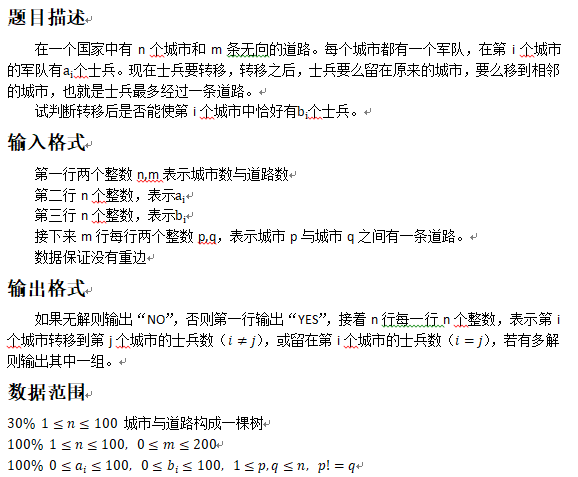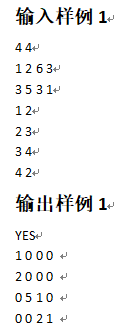高二&高一&初三模拟赛23 总结
前言
意识到比赛的时候已经过去了一个多小时;心情低躁;于是成功弃赛。。
Hacker
题解(二分/treap)
看完这题一直在想O(n)的方法,最后只想到一个O(nlogn)的方法。我们对于每个节点都以左端点建一棵treap,然后用右端点去找最小值即可。然而这样莫名被卡掉2个点。(treap的常数?!)
题解的作法是排序+二分,方法也差不多,只需维护一个后缀最小值即可。
另外还有用链表的O(n)作法,去看KsCla的博客吧。
代码(treap)
#include 代码(二分)
#include 记字符串
题解(状压DP)
这题是一道状压DP的好题。看了题解我才能做出来。
我们考虑将第i的字符串的第j位换掉,为了做到这个,我们可以直接将第i的字符串的第j位换成一个合法的字符,因为只有20个串,有26个字符,所以肯定可以。这样只影响自己的状态,将这位变成1,我们记当前已经独特的为1。另外的转移就是可以将其他串这一位和它一样的换掉,然后这样除了最贵的那个全换就行了,也影响了其他的状态。为了避免重复转移,确定的转移次序就是最后一个0(套路同2016 愤怒的小鸟)。然后就是一大堆的预处理了(见代码)。
时间复杂度 O(m2n+n2m) 。
代码
#include int main(){
scanf("%d%d", &n, &m);
for(int i = 1; i <= n; i++)
scanf("%s", &str[i]);
for(int i = 1; i <= n; i++)
for(int j = 1; j <= m; j++)
scanf("%d", &cost[i][j]);
for(int i = 1; i <= n; i++){
bool easy = false;
for(int j = 1; j <= m; j++){
bool f = true;
for(int k = 1; k <= n; k++){
if(str[i][j-1] == str[k][j-1]){
sum[i][j] += cost[k][j];
sam[i][j] |= (1<<(k-1));
Max[i][j] = max(Max[i][j], cost[k][j]);
if(i != k) f = false;
}
}
if(f) easy = true;
}
if(easy) start |= (1 << (i-1));
}
memset(dp, -1, sizeof(dp));
dp[start] = 0;
for(int s = start; s < (1<1; s++){
if(dp[s] == -1) continue;
int low;
for(int i = 1; i <= n; i++)
if(!((1<<(i-1)) & s)){
low = i;
break;
}
int ns;
for(int i = 1; i <= m; i++){
ns = s | (1<<(low-1));
if(dp[ns] == -1) dp[ns] = dp[s] + cost[low][i];
else dp[ns] = min(dp[ns], dp[s] + cost[low][i]);
ns = s | sam[low][i];
if(dp[ns] == -1) dp[ns] = dp[s] + sum[low][i] - Max[low][i];
else dp[ns] = min(dp[ns], dp[s] + sum[low][i] - Max[low][i]);
}
}
printf("%d\n", dp[(1<1]);
return 0;
} 士兵与旅行
题解(网络流)
网络流的裸题,初三打ACM的时候做过的,当时我的两个队友忘了拆点,拆完点最后WAWAWA,忘了考虑“人间蒸发”的情况。
其他的就是水题,从源向汇流,按图连边,判断能否满流即可,输出方案的话,由于直接最大流,于是发现每条边流了多少实际就是多少,于是反向边的容量就是方案。
多路增广有点不熟。
代码
#include 总结
虽然没有参赛,但还是感觉自己好菜,整天想数据结构,应该更加重视链表,二分等基础知识,还有重视dp的训练,熟悉套路后dp题才好做。
温柔正确的人总是难以生存,因为这世界既不温柔,也不正确。








